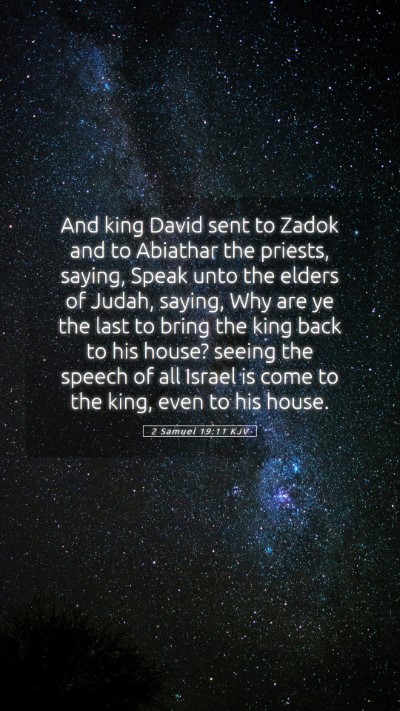Understanding 2 Samuel 19:11 - A Comprehensive Bible Verse Commentary
In the study of Scripture, understanding complex verses like 2 Samuel 19:11 requires an in-depth exploration of the text, historical context, and theological implications. This analysis draws from renowned public domain commentaries, including insights from Matthew Henry, Albert Barnes, and Adam Clarke.
Verse Background and Context
2 Samuel 19:11 states: "And King David sent to Zadok and to Abiathar the priests, saying, 'Speak unto the elders of Judah, saying, Why are ye the last to bring the king back to his house, seeing the speech of all Israel is come to the king, even to his house?'" This verse is set against the backdrop of David’s return to Jerusalem after his son Absalom's rebellion. The significance of this moment in Israel’s history cannot be overstated, and unraveling its layers reveals much about leadership, reconciliation, and God's providence.
Thematic Elements
-
Reconciliation:
This moment illustrates the theme of reconciliation. David desires to unite his people and heal the divisions caused by Absalom's rebellion. Matthew Henry emphasizes that David's call to the elders of Judah is not just for political return but invites spiritual restoration as well.
-
Leadership:
David's approach demonstrates wise and compassionate leadership. Albert Barnes notes that David uses this moment to remind the elders of their loyalties and responsibilities, encouraging them to act promptly and decisively in restoring order to the nation.
-
God's Sovereignty:
The return of David symbolizes God's sovereignty over Israel. Adam Clarke points out that this verse highlights the divine orchestration in bringing David back, illustrating that God’s plans unfold even amidst human failures and conflicts.
Bible Verse Analysis
The phrase “Why are ye the last to bring the king back to his house?” suggests a critical observation by David regarding the elders of Judah’s response to his return. This inquiry calls into focus their delayed action and possibly, their divided loyalties. Such scrutiny invites further exploration into the actions of the people of Judah, emphasizing the importance of recognizing rightful authority.
Commentary Insights
Matthew Henry notes that David's question implies a sense of urgency and expectation from the elders of Judah, encouraging them not to lag behind their fellow Israelites in welcoming their king. The nature of David's inquiry suggests that the elders hold a significant role in the healing and unification of the kingdom.
Albert Barnes elaborates on the notion that spiritual leaders often must rally their communities during times of unrest, drawing parallels between David’s appeal to Judah and how church leaders today must encourage faithfulness among their congregants.
Adam Clarke reminds us that transitions in leadership can evoke a variety of responses, and David’s strategic call to action underscores the complexities involved in governance and spiritual leadership in the ancient context.
Application of the Verse
The lessons extracted from 2 Samuel 19:11 extend to modern-day life through its exploration of leadership and community involvement. Understanding the depths of this verse aids individuals in reflecting on their roles within their communities and the importance of supporting rightful leadership.
Implications for Today
-
Taking Initiative:
This verse serves as a reminder to be proactive in supporting leadership within our communities—whether that be in churches, workplaces, or families. The delay of the elders can serve as a cautionary tale for contemporary audiences regarding the importance of action.
-
Unity and Healing:
Just as David sought to reunite a fractured kingdom, individuals today can play a vital role in promoting unity and healing divisions within their spheres of influence, echoing the reconciliation theme of this biblical narrative.
-
Embracing God's Plan:
Recognizing God’s hand in the movements of leadership can provide comfort and assurance during times of political or social turmoil. It encourages believers to trust in God's sovereignty throughout history.
Cross References
Several other Scriptures resonate with the themes and contexts presented in 2 Samuel 19:11. Consider the following passages for further reflection and study:
- 2 Samuel 15:11-12 - Highlights the conspiracy of Absalom and provides context to David's subsequent plight.
- Psalm 51 - David’s penitent heart after sinning, revealing his understanding of God’s mercy.
- Proverbs 21:1 - Illustrates God’s control over leaders’ hearts, reminding us of His ultimate authority.
- Isaiah 40:31 - Encouragement for those waiting on the Lord, paralleling themes of hope and restoration.
- Romans 13:1 - A New Testament perspective on the role of government and authority, echoing submission to rightful leadership.
Conclusion
2 Samuel 19:11 invites readers to delve into the multifaceted nature of leadership, community, and God’s oversight in history. Through the insights of esteemed commentators like Matthew Henry, Albert Barnes, and Adam Clarke, we gain enriched perspectives that can be applied in Bible study groups, personal reflections, and community discussions. May this exploration enhance your understanding of Scripture and inspire active engagement in God’s kingdom today.


